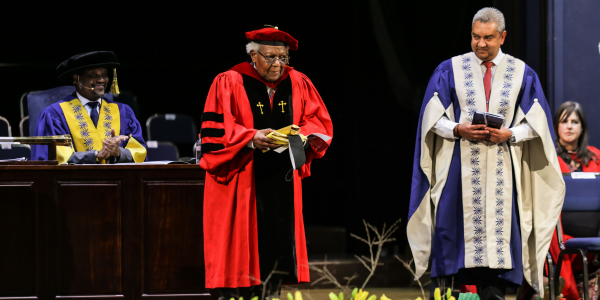Wits University confers Honorary Doctorate on Father Huddleston
- Wits University
Anti-apartheid chaplain described by some South Africans as "father ke motho" or "one of us"

The University of Witwatersrand (Wits) has conferred an Honorary Doctorate degree of Literature, honoris causa, posthumously, on the late anti-apartheid chaplain, Father Trevor Huddleston, in recognition of his outstanding contributions to humanity and intellectual enquiry.
The posthumous honorary doctorate was accepted by Reverend Canon Dr. Norman Montjane.
Montjane said he was honoured to accept the degree on behalf of Huddleston.
He said that Huddleston was an extraordinary individual who had dedicated his life to the pursuit of knowledge and compassion.
"I feel very honoured to accept the award on his behalf. My father is eventually being honoured by the university. I knew him from almost when I was a little child in nursery school, and I'm very privileged today to receive this degree on his behalf.
"I believe that the people in Sophiatown are glad that at last he is being honoured by Wits University after these years of working in Johannesburg and all the work that he has done in the Sophiatown community," said Montjane.
Among the attendees of the ceremony were a musician, conductor, and organist in the Anglican Church, as well as Huddleston’s friend Richard Cock.
Cock said Huddleston was a very important figure in the Anglican Church in South Africa.“Father Huddleston was here as the rector of Christ the King in Sophia Town, and at the time when Sophiatown was affected by Group Areas Act in the days of apartheid. He was one of the important people who resisted the changes in those days. And in in many ways, he supported not only the congregation that he had in that area, but all the people of Sophiatown, and he became associated with figures like Hugh Masekela, Miriam Makeba, and in fact he gave Hugh Masekelahis first trumpet when Hugh Masekela was a young boy.”
“Huddleston was connected to the community of the resurrection, which was an important religious order in the history of South Africa. I think it's fantastic that the university can now honour him by giving him an honorary doctorate all these years later,” said Cock.
Father Huddleston was born in England in 1913, he studied at Oxford University and then at Wells Theological College. In 1939, he joined the Community of the Resurrection (CR), an Anglican religious order, and served for two years at St. Mark’s in Swindon, before he took his vows in 1941. Father Huddleston arrived in Rosettenville, Johannesburg in 1943, and served as a Minister of the CR Mission in Sophiatown, Orlando, and surrounding townships for 13 years.
In 1949, he was elected Provincial of the Community of the Resurrection in South Africa and was made Superintendent of St. Peter’s School. Later, he made the decision to close St. Peter’s School rather than hand it over to the apartheid government under the Bantu Education Act. Father Huddleston embraced with his whole being the people he was called to serve.
He was described by some South Africans as “father ke motho” or “one of us”. He raised money to build the Huddleston Swimming Pool in Orlando and started the African Children’s Feeding Scheme to alleviate hunger in communities. He often said that he did not regret having biological children because God had given him countless children. When Hugh Masekela, Jonas Gwangwaand others expressed their love for jazz music, he made the establishment of the Huddleston Jazz Band possible, and arranged a trumpet and coaching for Masekela in particular.
The advent of apartheid and the implementation of structured and systemic discrimination and segregation contrasted deeply with Father Huddleston’s commitment to social justice and his beliefs in human rights for all. With the implementation of the 1950 Group Areas Act, Father Huddleston protested on the frontlines alongside activists like Helen Joseph, former president Nelson Rolihlahla Mandela and Ruth First, to prevent the forced removal of Sophiatownresidents. He arranged for the priory to be always open to assist people who had been shot or wounded and led processions on the streets of Orlando, Soweto.
His defiance of the apartheid government and authorities continued throughout the 13 years that he spent in South Africa. He was close friends with the late Oliver Tambo and other anti- apartheid stalwarts, and in 1955 along with Chief Albert Luthuli and Dr Yusuf Dadoo, was granted the first Isitwalandwe or Seaparankoe Award, the highest accolade of the African National Congress (ANC) for his contribution to the fight for freedom and liberation in South Africa. This was on the eve of his departure from South Africa.
Out of fear for his safety, Father Huddleston was recalled by the Anglican Church, and he returned to England at the end of 1955, where he was later elected as a Bishop. He continued with the anti-apartheid struggle abroad and wrote a book around the forced removals in Sophiatown titled Naught for your Comfort which attracted global attention. He launched the Anti-Apartheid Movement (AAM) with Julius Nyerere, the former president of Tanzania in 1959, and was elected as the Vice- President of the Movement in 1961, a position that he held for two decades. In 1960 Huddleston was sanctified as the Bishop of the Masasi in Tanzania, a position he held for eight years. He then became Bishop of Stepney and a decade later was appointed as the Bishop of Mauritius. In 1978, he was elected as the Archbishop of the Province of the Indian Ocean.
Father Trevor Huddleston was a courageous spiritual leader who fought for the freedom of South Africa for over 50 years. In his song Makhaliphile which means “The Dauntless One”, Todd Matshikiza sums up the fearless contribution of Father Huddleston to the liberation of the people of South Africa. It is therefore befitting that the University of the Witwatersrand, Johannesburg bestows an Honorary Doc.
